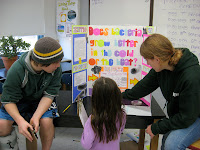After Thanksgiving, 6th, 7th, and 8th grades started new units in science class. 6th and 7th have been learning about the tiny units that make up all living things:
cells! After we got some perspective about the sizes of things (atoms, molecules, cells, tissues, organs...), we learned about the many parts of cells (organelles). We'll spend next week making our own Cell Cities!
Each student will make a city that carries out all of the jobs that our cell organelles perform.
8th grade is working on an
electricity unit. We've seen the effects of static electricity, and now we're moving on to current electricity. Students are working in pairs to complete their electricity challenges. So far, they've succeeded in lighting a bulb with only a wire and a battery (not as easy as it sounds!); next week each team will explore circuits and invent a device that can tell if a material is a conductor or nonconductor.
After the holiday break, we'll be learning about how materials move in and out of cells. Experiments will involve eggs, potatoes, vinegar, salt water, food coloring, and corn syrup. No, we won't be eating them! We'll also focus on the important processes that happen in our cells (cellular respiration) and in plant cells (photosynthesis).






